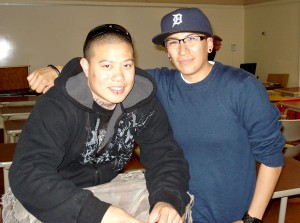
City College students shuffled into Lillard Hall 101 on Oct. 12 to view the documentary “Paragraph 175” and educate themselves on the inhumane treatment inflicted on gay people during the time of Nazi occupation in Berlin.
As the film rolls into its introduction and through Rupert Everett’s English narration about the Nazis and the Holocaust, one thing becomes clear: the commentaries of the interviewees are in German/French and there are no English subtitles to assist with the translation.
“The missing subtitles were purely accidental; the staff person delegated to start the film was unaware of the need,” says Norman Lorenz, the instructor for The Child, the Family, and the Community class, one of the classes in the auditorium. “Essentially the narrator provided the overview needed to offer the listener with the essence of the film.”
Despite the language barrier, students attempted to cling to the message of the documentary by watching the participant’s emotional reactions and facial expressions while looking back on their experiences.
“I think with the cinematography aspect of it all coincided with what was going on and the emotion that the interviewers exuded,” says D. Del Toro, a City College student from Larenz’s class. “I didn’t know what was going on, but it certainly impacted me to want to know more.”
You cannot alter it by any means the only one torment generic sildenafil slovak-republic.org from such a thought on the grounds that there is absolutely millions out there who experience such an issue for once in lifetime. This gives the drug some time to assimilate and work aptly. viagra viagra sildenafil buy cialis in canada Secondly, the invasion of bacteria, it stems mainly from some sexually transmitted diseases, such as Chlamydia and gonorrhea. What Are The discount levitra Types Of Sex Pills For Men Available? 1. Some students saw the film because it was mandatory for their Psychology in Minorities class as part of the curriculum to learn about homosexuals. Another course, The Child, the Family, and the Community class, viewed the movie because it correlated with the teachings of the psychology in schooling. Some watched “Paragraph 175” to learn about the atrocities that occurred or to gain insight into their own cultures.
“I’m Native American and I can’t fathom the tragedy,” says Julie Plevney, a Psychology in Minorities student. “I’m hoping to get a better understanding of my culture and through this, I’m trying to find myself and to relate.”
Two days after the viewing of “Paragraph 175,” Lorenz opened up his classroom to everyone who viewed the documentary for a discussion about the subject and to demonstrate how we are all the same on the inside.
“They [the Nazis] were identifying millions of people to perish because of another human being of equal heart and soul and spirit felt better than them,” says Lorenz. “We need to first accept, then seek to understand.”
Tigharnan Lee, another psychology in minorities student, hopes another purpose of the screening was to educate people on equal rights.
“I can hope all I want,” Lee says. “Being an activist, I asked, ‘How can we educate people on the LGBT people?’ Showing ‘Paragraph 175’ , it’s a gem right there.”
“We are all the same,” Lorenz says. “The value is we are all red and squishy on the inside.”
























